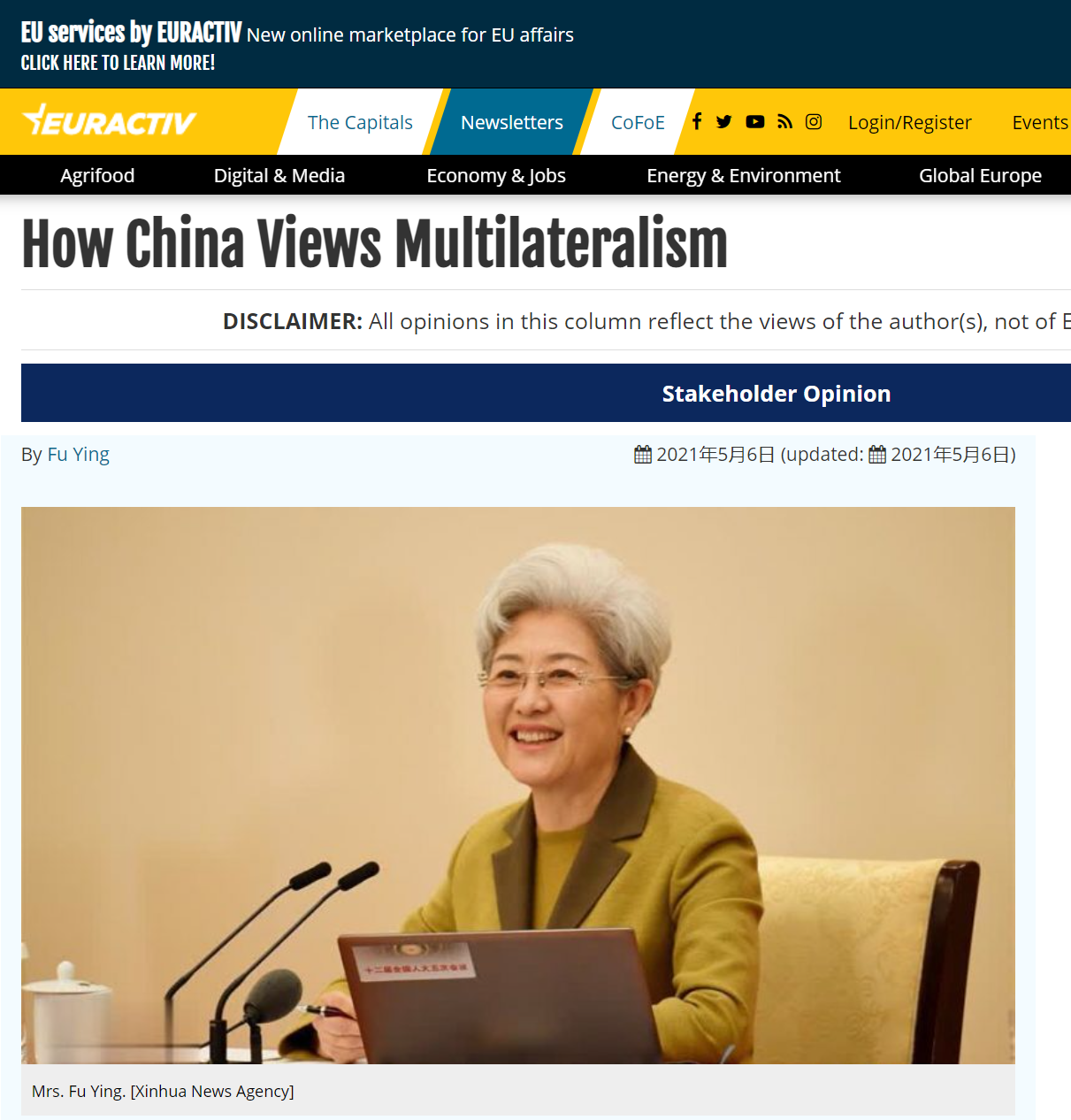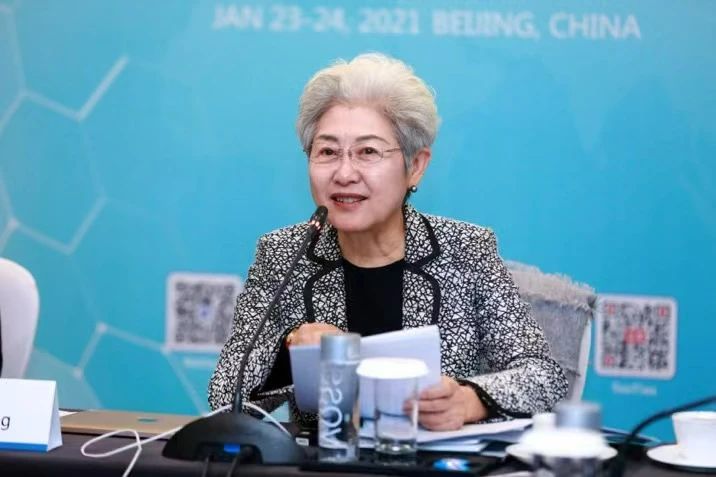2021年5月6日,“欧盟动态”(EurActiv)网站观点栏目发表了清华大学战略与安全研究中心主任傅莹的题为《中国与多边主义》的文章,以下为中英文全文:

中国人理解的多边主义是协商一致、合作治理、互利共赢。中国与欧洲对维护多边主义应该是有共识的,因为中欧都主张通过国际合作解决人类共同面临的挑战,都支持在联合国框架下的多边机构中协调处理分歧。推崇多边主义的大师鲁杰(John Ruggie)说过:“(多边主义)这一术语的定义意味着合作。”合作是中欧关系硕果累累的原因,也是未来继续合作的基础。
今年1月,中国国家主席习近平在世界经济论坛“达沃斯议程”对话会的特别致辞中重点向世界阐释了中国的多边主义立场,表示要“始终维护以联合国为核心的国际秩序和国际体系,始终遵守以联合国宪章为宗旨的国与国关系基本准则。”
中欧之间已经构建起互相依存度比较高的复合型关系,中国是欧盟最大的贸易伙伴,2020年双边贸易额达到6495亿美元,在新冠疫情期间,中欧班列运送了大量抗疫物资,为欧洲抗击疫情发挥了重要作用。从电视上可以看到载满来自欧洲货物的中欧班列,让人深深体会到中欧之间并不遥远,双方有广阔合作空间。
今年3月我参加了意大利国际事务研究所举办的一场关于“欧洲战略自主”的研讨会。欧洲面对中美紧张关系、大国竞争等新的国际环境,感到困扰和压力,“欧洲战略自主”是因应变化而出现的思想潮流。
我在会上感受到了欧洲人对与中国深化关系、增进了解的愿望,同时也意识到存在对中国有误解和分歧的问题。中欧由于文化、历史等多方面原因,难免存在认识上的差异,应该就各种新问题开展对话,增进了解,避免在误解基础上做判断。
2020年爆发的新冠疫情对人类的启示之一是:在全球挑战面前没有国家可以独善其身。从历史的角度看,最大的遗憾是多边主义精神的缺位,大国乃至国际机制未能发挥足够的凝聚作用来调动国际抗疫合作。由此可见,中国和欧洲不应受到分歧的干扰,我们应更多聚焦共同利益,秉持多边主义精神,团结应对全球挑战。中欧需要建立更多沟通的桥梁,开展更多系统性对话,以冷静和平和的态度交流思想,增强对彼此的了解和信任。
回望历史,人类推动多边主义的初衷是为了化干戈为玉帛,多边主义是为寻求和平而诞生的。现代国际关系形成之前就存在多边交往与合作的雏形,古希腊时期斯巴达牵头的伯罗奔尼撒同盟和以雅典为核心的提洛同盟,被视为多边外交的早期形态。在两千多年前的中国也有多边交往形态,例如,春秋战国时期的会盟制度等。但是,现代以维护和平和促进合作为目的的多边主义,还是诞生于20世纪,两次世界大战的惨痛教训促使人们思考如何建立一种能够调和国家间利益、终止战争、实现世界永久和平的多边机制。联合国的成立和联合国大厦门前扭结的枪筒,宣告了在国际社会依仗多边主义精神开展国际治理的共同意志。
20世纪90年代以来,在冷战后世界和平发展潮流的推动下,多边主义得到越来越多和有效的发挥,多边国际合作激发出新的活力,多边协商、多边合作成为21世纪人类社会探索共同治理的主要方向。其间,联合国及其附属机构发挥着重要作用,新的世界大战得以避免,不少局部冲突得到控制,十几亿人成功脱贫,联合国宪章成为“世界和平与发展的重要保障”。可以认为,多边主义作为维护国际秩序和规范的基本范式,得到广泛认可和支持。
对中国人来说,现代多边主义是一个比较新的概念,我们经历了从学习到接受再到坚决主张和积极实践的过程。伴随着中国在上个世纪80-90年代步步深入的改革开放,中国人开始接触和了解多边主义理念。例如在亚洲地区,我们从成为东盟对话国为起点,开启了多边外交和参与区域合作的进程。为了了解和学习多边主义概念和实践,我和同事们还曾专程到加拿大、新加坡等国家开展访谈活动。
这些年来,中国陆续加入了各种国际多边组织,例如1986年加入关贸总协定(世贸组织前身)和亚洲开发银行、1991年加入亚太经合组织等。中国不仅成为以东盟10+1、10+3等机制为中心的地区多边合作的重要成员和活跃的贡献者,还开始主动设计和构建多边外交机制,例如组织和有效推进朝核六方会谈,举办上合会议和金砖会议,发起中国-东欧国家(17+1)多边合作机制等。在军事安全领域,中国积极参加联合国裁军会议,签署了《全面禁止核试验条约》等一系列条约。中国非常重视联合国、世界贸易组织、二十国集团等框架下的多边组织,坚定维护以联合国为核心的国际体系,在事关全球发展的如经济恢复、气候变化、公共卫生、防范恐怖主义等多边议程上,中国都成为不可或缺的参与方和贡献方。
进入21世纪,中国的多边主义实践更加主动和积极,倡导建立了亚洲基础设施投资银行,提出共建“一带一路”。在2020年新冠疫情肆虐全球时,中国不仅努力控制和克服国内疫情,还广泛开展双边和多边合作,参加了联合国、二十国集团和世界卫生组织框架下的协调工作,倡导人员和物资的便利化安排,帮助贫困国家缓解债务难题,向联合国维和人员捐赠疫苗[1],在气候变化领域承诺力争2030年碳排放达到峰值、努力争取2060年实现碳中和等[2]。在短短40多年时间里,中国人对多边主义概念的认识和了解有了大幅度的提升,在行动上也有了质的飞跃。作为一个发展中大国和参与国际事务的后来者,这个进步是很了不起的。
欧洲人重视多边主义理念,欧盟就是多边主义的产物,也是迄今世界上最成功和成熟的地区性多边主义范例。就像欧盟外交和安全政策前高级代表费代丽卡·莫盖里尼说的,“欧盟生来就支持多边主义,多边主义融在欧盟的DNA里。”从语言学的角度看,多边主义这个词以“ism”结尾,因此可以理解为属于“信仰”意义上的概念。牛津词典对多边主义的释义是“在多边基础上形成协议或条约的原则或者实践。”[3]大英百科全书更为具体地说明,这些原则是“参与者之间不可分割的利益、传播互惠的承诺、旨在强制执行一种特定行为模式的争端解决制度”[4]。由此可见,多边主义不应是实现独家目标的手段,采用多边主义不能只为了实现自身利益的最大化,有时甚至需要出让一定的利益,目的是通过利他和维护多方利益来满足更为宏大的利益需求。我相信,欧洲不希望多边主义成为任何国家谋取国家利益的工具,中国也不希望。
多边主义体现了人类历史发展的正确方向,体现的是平等、互利和开放的原则,通过对话协商的方式,力求在最大程度上照顾各方利益和关切。多边主义反对排他性和歧视性,在遵守规则的情况下,发挥全球和区域多边框架和机制的作用,推动世界和平、发展。大国在推行多边主义理念时,尤其需要克制追求独家利益的冲动,应能更多考虑整体利益和平均需求。如果把多边主义作为一种信念,那么就不应该建立在特定政治制度或者价值基础之上,而应该是基于和平、发展、公平、正义、民主、自由的全人类共同价值,是对人类美好未来的信念。
当前,中美紧张关系对世界造成比较大的影响,欧洲在复杂形势下需要独立思考的空间。中国和美国没有必要也没有理由要求欧洲国家选边站队,欧洲与中国和美国都有紧密的合作关系,无论如何选择都会伤及自身利益。而且,从维护全球体系的完整性角度出发,欧洲也有责任劝说和帮助中美克服和解决分歧,而不是扩大矛盾乃至分裂世界。

我很认同欧洲理事会主席米歇尔先生的观点:“多边主义才是应对全球性挑战的关键。”中国和欧洲都是当前世界的重要力量,以开放的姿态开展双方都有需要的合作是应对全球挑战的关键。我们应当坚持联合国在国际事务中的核心作用,维护所有国际社会成员平等参与的透明、公正、合理的国际秩序和体系。中欧应在关系到全球共同未来的重要议题下积极开展合作。例如在全球公共卫生问题上,中欧应在疫苗的有效发放和世界经济、国际交往的安全恢复上协商合作。2020年9月中欧正式签署《中欧地理标志协定》,决定共同打造中欧绿色合作伙伴、数字合作伙伴关系,这些都将促进中欧关系的深入发展。
2020年人类经历了史上罕见的多重危机,作为世界两大力量、两大市场、两大文明,中欧通力合作将是多边主义的胜利,中欧并肩前行是对人类社会的贡献。
How China Views Multilateralism
By Fu Ying
06-05-2021,EURACTIV
(https://www.euractiv.com/section/eu-china/opinion/how-china-views-multilateralism/)
Multilateralism, as we in China understand it, is about seeking consensus through consultation and manage common affairs through cooperation for shared benefits and win-win results. In this sense, China and Europe share a common interest in upholding multilateralism.
We both believe that the challenges faced by humankind should be tackled through international cooperation, and differences need to be addressed through consultations in multilateral institutions within the framework of the United Nations (UN). As John Ruggie, a renowned champion of multilateralism, said that “the definition of the term (multilateralism) means cooperation.” In China-EU relations, cooperation is not only the source of fruitful achievements to date but also the foundation for future cooperation.
In his special address at Davos Agenda, a virtual event with the World Economic Forum, Chinese President Xi Jinping expounded on China’s stance in upholding multilateralism. He said that China remains firm in its position to safeguard the international order and international system that is centered around the UN, and abide by the UN Charter of the United Nations as the basic and universally recognized norms governing state-to-state relations.
China and the EU have established a highly interdependent structure of relations. China’s trade with Europe registered USD 649.5 billion in 2020, making it the EU’s largest trading partner. During the COVID-19 pandemic, China Railway Express (CRE) delivered huge quantities of anti-virus supplies to European states,contributing to their fight against the pandemic. Watching on TV the arrival of CRE trains carrying varieties of European goods and products, I have no doubt that, despite the geographic distance, the two sides stand close with each other and share great potential for cooperation.
In March of this year, I attended the “European Strategic Autonomy” seminar hosted by the Italian Institute of International Affairs (IAI). The impression I had was that, against the background of changing international environment that features tense China-US relations, Europe is stressed by the pressure of major power competition. The concept of “European strategic autonomy” gained attention as a response to world changes.
The seminar provided a chance for me to appreciate the desire among the Europeans to further grow ties and deepen understandings with China. I also realized that there exist misunderstandings and differences between us which is not a surprise as we have grown out of different cultures and history. It gives us greater reason to have more frequent conversations including over various emerging issues to build better mutual understandings. I think it would be dangerous for major players in the world to decide on matters concerning each other based on misunderstandings.
One lesson we can learn from the COVID-19 pandemic in 2020 is that no country can face global challenges alone. Reflecting from a historic perspective, one can see the lack of multilateralism in this battle as the biggest disappointment. Major countries, even international institutions, failed to effectively gather enough strength in the global fight against the virus. Learning from this lesson, China and the EU should not be troubled by differences and focus on common interests and pull through global challenges together by upholding multilateralism. China and the EU should expand communication, increase systematic conversations, and exchange ideas in a calm manner.
Looking back at history, multilateralism was forged with purpose of stopping war and forging amicable ties. It was born for peace. The earlier form of multilateralism appeared long before the modern international relations took shape. The Peloponnesian League led by Sparta in ancient Greece and the Delian League led by Athens were two examples regarded as multilateral diplomacy in its early days. Similar experience can also be found in ancient China more than two thousand years ago, i.e., leagues of lords during the Spring and Autumn Period and the Warring States Period. In the 20th century, the bitter lessons of the two World Wars compelled people to explore a multilateral mechanism that could coordinate inter-states interests, end wars, and ensure lasting world peace. The founding of the UN and the image of the Non-Violence sculpture at the UN Headquarters voiced, loud and clear, the common aspiration of the international community to uphold multilateralism in international governance.
Since the 1990s, driven by the trend of peaceful development in the post-Cold War period, multilateralism has been more broadly and effectively practiced. Multilateral cooperation have gained new energies around the world, and multilateral consultation and cooperation have become the main channel for finding ways and means for global governance in the 21st century. The UN and its affiliated institutions have been playing a critical role in this process. New world wars have been avoided, many regional conflicts mitigated, and billions of people have successfully risen out of poverty. The UN Charter has become an essential guarantee of world peace and development. It can be argued that multilateralism, as a basic paradigm safeguarding international orders and norms, has gained broad recognition and support.
For many people in China, modern multilateralism is a relatively new concept, which we took time to learn, accept, and then firmly uphold. As China moved fast with reform and opening-up in 1980s and 1990s, there is also growing awareness about the concept of multilateralism along with greater contact with outside world. For example, in Asia, since becoming a Dialogue Partner of the Association of Southeast Asian Nations (ASEAN), China embarked on its journey of participating in multilateral diplomacy and regional cooperation. My colleagues and I visited Canada and many other countries to study the concept and learn about how multilateralism is practised in various fields.
The past years have seen China become a member of many global multilateral institutions. China joined the General Agreement on Tariffs and Trade (GATT), predecessor of the World Trade Organization (WTO), and the Asian Development Bank (ADB) in 1986, and joined the Asia-Pacific Economic Cooperation (APEC) in 1991. China not only plays a role in regional multilateral cooperation centered around the ASEAN Plus format, but also takes the initiative to design and build new multilateral mechanisms. For example, China organized and promoted the Six Party Talks on North Korean nuclear issues, hosted summits for BRICS and the Shanghai Cooperation Organization (SCO), and initiated the Cooperation between China and Central and Eastern European Countries (17+1). Regarding military security, China actively participated in the UN’s Conference on Disarmament, and signed a number of treaties including the Comprehensive Nuclear Test Ban Treaty (CTBT). China highly values multilateral institutions within the frameworks of the UN, WTO, and the Group of Twenty (G20), and vows to safeguard the international system centered around the UN. It is now an indispensable participant and contributor to many multilateral agendas on global development, including economic recovery, climate change, public health, and counterterrorism.
Entering into the 21st century, China has become more proactive in multilateral agendas, by, for example, initiating the Asian Infrastructure Investment Bank (AIIB) and the Belt and Road Initiative (BRI). When the COVID-19 pandemic gripped the world, China not only endeavored to contain the virus at home, but also engaged in extensive bilateral and multilateral cooperation. Specifically, by working with the UN, G20, and the World Health Organization (WHO), China facilitated access for personnel and supplies, helped ease the debt of poverty-stricken countries, donated vaccines to UN peacekeepers[1], and in order to tackle climate change, pledged to achieve a peak in carbon emissions by 2030 and become carbon neutral by 2060.[2] Within just four decades, not only have the Chinese people significantly improved their understanding of multilateralism, but they also achieved a qualitative leap in translating the concept into practice. Therefore, it is fair to say that China, as a large developing country and a latecomer in international affairs, has secured remarkable progress.
Europeans value multilateralism, and the founding of the EU is viewed in the world as a successful product of multilateralism. It is now the most fruitful and sophisticated example of regional multilateralism in the world. As remarked by Federica Mogherini, former High Representative of the European Union for Foreign Affairs and Security Policy, “the European Union is genetically programmed to support multilateralism—multilateralism is in its DNA.” The word “multilateralism” ends with “ism,” which, based on linguistic analysis, often means a sort of “belief.” The Oxford Dictionary defines “multilateralism” as “the quality of being multilateral; the principle or practice of forming agreements or treaties on a multilateral basis.”[3] The Encyclopedia Britannica explains more specifically that these principles are “an indivisibility of interests among participants, a commitment to diffuse reciprocity, and a system of dispute settlement intended to enforce a particular mode of behavior.”[4] Therefore, multilateralism should not be used for the goals or interest maximization of any single party. Sometimes it is even necessary for the parties to make concessions so that one’s own interests can ultimately be met by practicing altruism and safeguarding multi-party interests. I think it is not Europe’s desire to allow multilateralism be used as a tool to serve the interests of one single party. Neither does China.
Multilateralism is now commonly viewed as the right direction for the progress of mankind—that is, it strives to address the interests and concerns of all parties as much as possible through dialogue and consultation, based on principles of equality, mutual benefits, and openness. Opposing exclusiveness and discrimination, multilateralism encourages global and regional multilateral frameworks and mechanisms to play their role in promoting world peace and development in a rule-based manner. When major countries comply with multilateralism, they must restrain themselves from seeking only their own interests; instead, they should consider overall interests and average needs. Multilateralism, if regarded as a belief, should not be one based on a particular political system, but on universally shared common values, such as peace, development, fairness, justice, democracy, and freedom, which underpin a bright future of humankind.
While tensions between China and the US are exerting an impact on the world and the political climate is getting more complicated, Europe needs space for independent thinking. There is no need or reason for Beijing or Washington to ask European countries to take sides. Europe has developed close partnership with both China and the US, which means its interests would be undermined whichever side it took. Moreover, to maintain the integrity of the global system, Europe has the responsibility to persuade and help China and the US to grapple with their differences, instead of expanding contradictions and even splitting the world.
I tend to agree with Charles Michel, President of the European Council, that multilateralism is the key to meeting global challenges. For China and Europe, both important players in the international arena, the key lies in cooperation in an open manner. We should uphold the central role of the UN in international affairs and maintain a transparent, fair, and reasonable international order in which all members of the international community engage on an equal footing. China and the EU should work together on important issues concerning the future of all. For example, for the good of global public health, we should collaborate on the rollout of vaccines and the safe recovery of the world economy and international exchanges. In September 2020, China and the EU signed the EU-China Landmark Geographical Indications Agreement, aiming at building a green and digital partnership. All of these efforts will advance in-depth development of China-EU relations.
In 2020, humanity has experienced multiple crises that are rare in history. As two major forces, markets and civilizations in the world, our close cooperation will be a victory of multilateralism and will render a contribution to the progress of human society.
(Fu Ying is the Chair of Center for International Security and Strategy (CISS) at Tsinghua University and former Vice Foreign Minister of China.)
来源:“欧盟动态”(EurActiv)网站观点栏目
